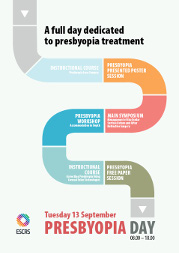Boston keratoprosthesis type 1: outcomes, complications and the importance of appropriate patient selection
Session Details
Session Title: Cornea Surgical II
Session Date/Time: Tuesday 13/09/2016 | 08:00-10:30
Paper Time: 09:38
Venue: Hall C2
First Author: : C.Samarawickrama UK
Co Author(s): : T. Ayoub M. Wilkins
Abstract Details
Purpose:
To evaluate the outcomes of Boston type 1 keratoprosthesis (K-Pro) surgery in a cohort of patients at Moorfields Eye Hospital.
Setting:
Moorfields Eye Hospital, London.
Methods:
All K-Pro surgical cases performed between March 2011 and July 2015 were included. Medical records were reviewed and pre-operative, operative and post-operative parameters recorded.
Results:
41 eyes of 40 patients were included. Mean duration of follow-up was 30.4 months (range: 8-60). The main indication for K-Pro surgery was multiple failed grafts (49%). 15 cases (36.5%) had known optic nerve/retinal disease and mean BCVA initially improved from CF to 2/60 at 6 weeks, before slowly returning to CF over a year. In contrast, those without optic nerve/retinal disease improved mean BCVA from CF to 6/18 before declining to 6/36. There were 3 retroprosthetic membranes, 3 progressive glaucoma, 6 retinal detachments, 3 infective keratitis with 2 subsequent K-Pro extrusions and 2 cases of vitritis of which 1 progressed to endophthalmitis and loss of the K-Pro. In all 3 (7.3%) cases required removal of the K-Pro.
Conclusions:
The implantation of the Boston Kpro in high risk cases can lead to improved vision, with the main limiting factor on vision being posterior segment pathology. Significant complications mean that it should continue to be used in very selected cases.
Financial Disclosure:
NONE





